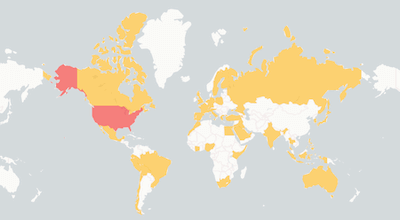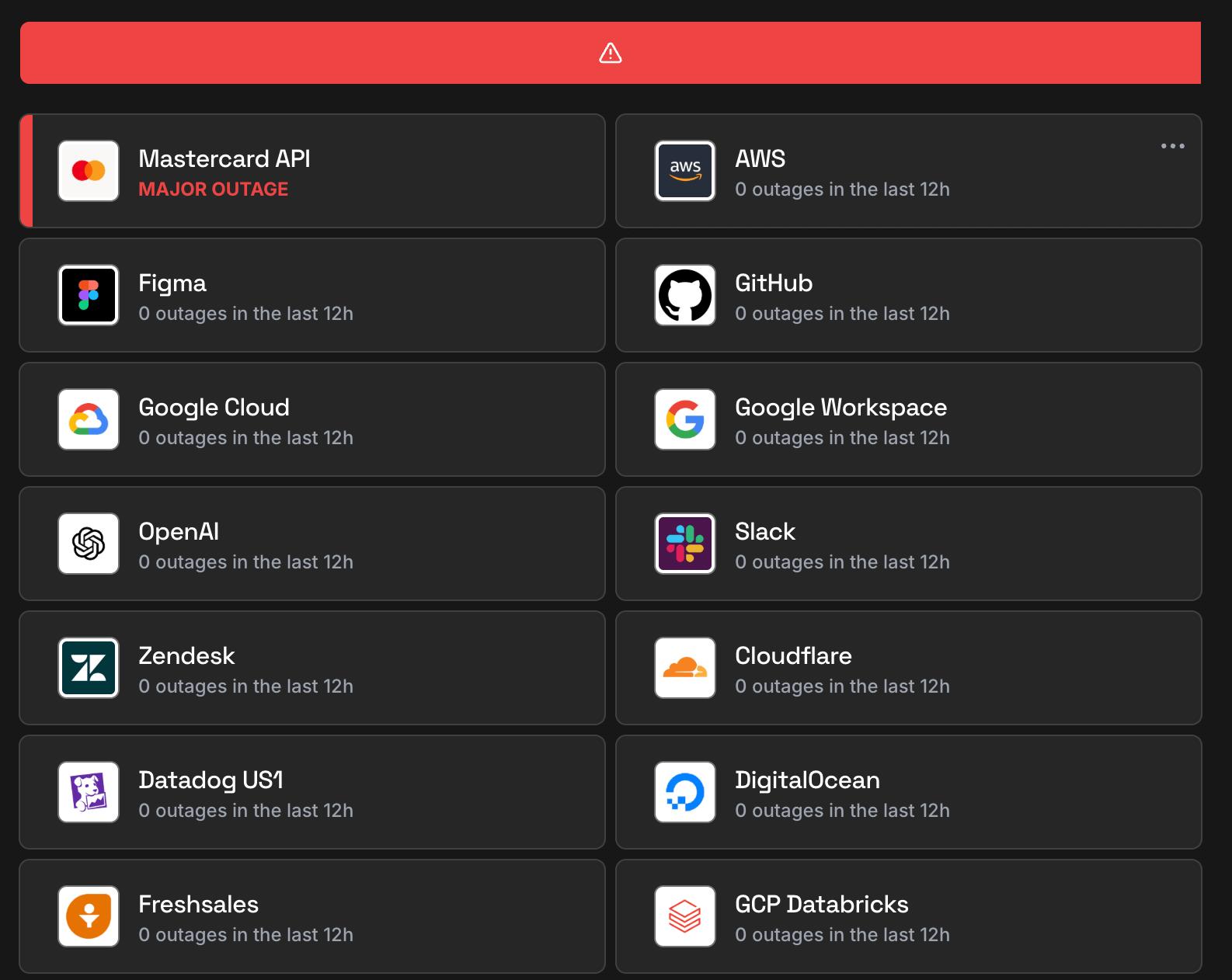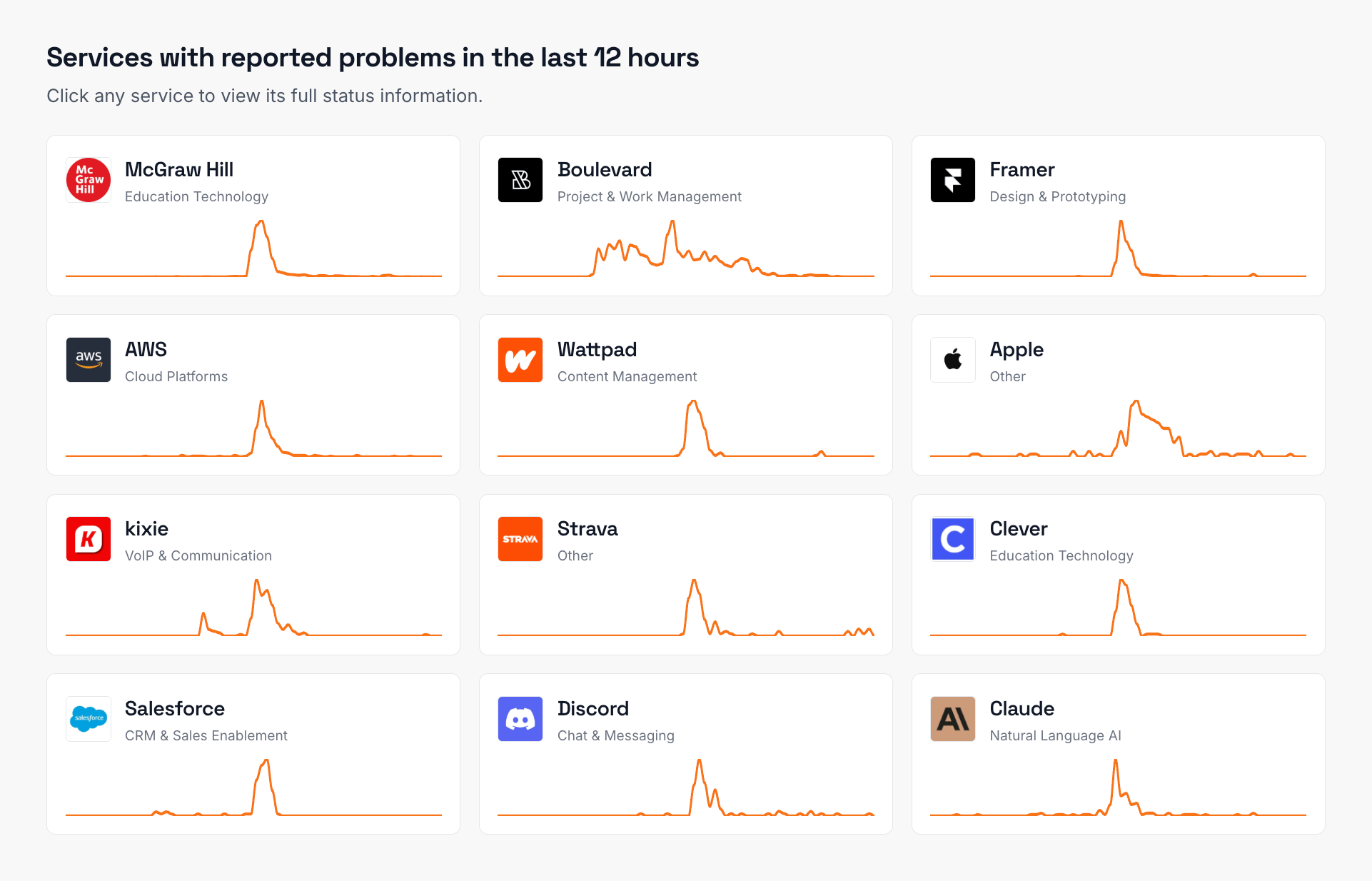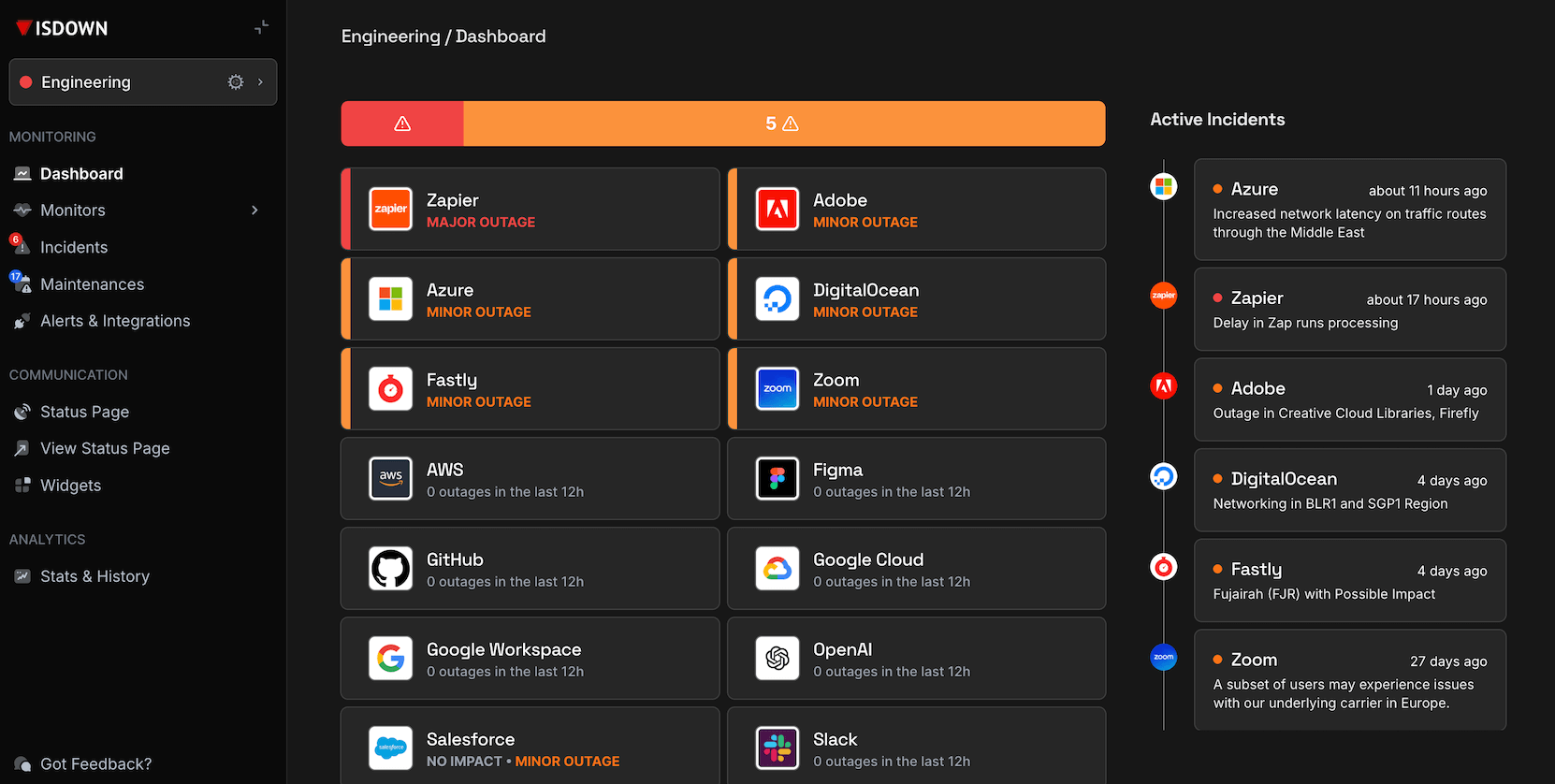Is Red Hat Down? Red Hat Status & Outages
Red Hat status updated
What is Red Hat status right now?
Red Hat is having a major outage
Red Hat service health over the last 24 hours
This chart shows the number of user-reported issues for Red Hat service health over the past 24 hours, grouped into 20-minute intervals. It's normal to see occasional reports, which may be due to individual user issues rather than a broader problem.
Outage Map

See where users report Red Hat is down. The map shows recent Red Hat outages from around the world.
Red Hat Outage Map
Red Hat Downtime Health — Last 90 Days
In the last 90 days, Red Hat had 20 incidents (18 major outages and 2 minor incidents) with a median duration of 3 hours 11 minutes.
Incidents
Major Outages
Minor Incidents
Median Resolution
Recent Red Hat outages detected by IsDown
Full incident reports for recent Red Hat outages, including timelines, affected components, and resolution details.
| Title | Started At | Duration |
|---|---|---|
|
ROSA clusters degraded in me-south due to a localized power issue in mes1-az2.
Customers are advi...
|
Mar 02, 2026 at 07:22 AM UTC
|
Ongoing |
|
ROSA clusters degraded in me-central
AWS Status Page: https://health.aws.amazon.com/health/status
|
Mar 01, 2026 at 02:02 PM UTC
|
Ongoing |
|
We are observing an increase in 500s on pulls and pushes, the team is current investigating.
|
Feb 18, 2026 at 08:51 PM UTC
|
about 1 hour |
|
There is a planned SFDC outage on DATE. SFDC will be completely inaccessible for 5 minutes.
PLA...
|
Feb 12, 2026 at 11:02 AM UTC
|
about 5 hours |
|
There is a planned SFDC outage on DATE. SFDC will be completely inaccessible for 5 minutes.
PLA...
|
Feb 12, 2026 at 06:55 AM UTC
|
about 9 hours |
|
We are investigating a partial outage with the Hybrid Cloud Console Notifications service. All no...
|
Feb 10, 2026 at 10:29 AM UTC
|
about 6 hours |
|
We are currently investigating this issue.
|
Feb 09, 2026 at 09:43 PM UTC
|
43 minutes |
|
We are currently investigating an issue where ROSA Classic and HCP clusters cannot schedule Y-Str...
|
Feb 05, 2026 at 03:41 AM UTC
|
about 8 hours |
|
We're experiencing latency issues with a download service used by the Downloads portion of the Cu...
|
Feb 04, 2026 at 12:13 AM UTC
|
about 13 hours |
|
We have identified an issue affecting DNS resolution for registry.access.redhat.com and registry....
|
Jan 30, 2026 at 07:12 AM UTC
|
44 minutes |
Red Hat Components Status
Check if any Red Hat component is down. View the current status of 7 services and regions.

Red Hat
+ 6,019 other services
The Status Page Aggregator with Early Outage Detection
Stop checking status pages manually. Get instant alerts to your team's tools.
14-day trial · No credit card · 5-min setup
About Red Hat Status and Outage Monitoring
IsDown has monitored Red Hat continuously since April 2020, tracking this Container & Orchestration for 6 years. Over that time, we've documented 494 outages and incidents, averaging 7.1 per month. When Red Hat goes down, incidents typically resolve within 284 minutes based on historical data.
We monitor Red Hat's official status page across 50 components organized into 7 groups. IsDown interprets Red Hat statuses (operational, degraded performance, partial outage, and major outage) to deliver precise health metrics and filter alerts by the components you actually use.
To check if Red Hat is down, IsDown combines official status data with user reports for early detection. Vendors often delay acknowledging problems, so user reports help us alert you before the official announcement.
Engineering and operations teams rely on IsDown to track Red Hat status and receive verified outage alerts through Slack, Teams, PagerDuty, or 20+ other integrations.
How IsDown Monitors Red Hat
IsDown checks Red Hat's status page every few minutes, across all 50 components. We combine official status data with user reports to detect when Red Hat is down, often before the vendor announces it.
When Red Hat status changes, IsDown sends alerts to your preferred channels. Filter by severity to skip noise and focus on outages that affect your business.

What you get when monitoring Red Hat with IsDown
Track Red Hat incidents and downtimes by severity
IsDown checks Red Hat official status page for major/minor outages or downtimes. A major outage is when Red Hat experiences a critical issue that severely affects one or more services/regions. A minor incident is when Red Hat experiences a small issue affecting a small percentage of its customer's applications. An example is the performance degradation of an application. The moment we detect a Red Hat outage, we send you an alert and update your dashboard and status page.
Get alerted as soon as users report problems with Red Hat
Red Hat and other vendors don't always report outages on time. IsDown collects user reports to provide early detection of outages. This way, even without an official status update, you can stay ahead of possible problems.
All the details of Red Hat outages and downtimes
IsDown collects all information from the outages published in Red Hat status page to provide the context of the outage. If available, we gather the title, description, time of the outage, status, and outage updates. Another important piece of information is the affected services/regions which we use to filter the notifications that impact your business.
Prepare for upcoming Red Hat maintenance events
Red Hat publishes scheduled maintenance events on their status page. IsDown collects all the information for each event and creates a feed that people can follow to ensure they are not surprised by unexpected downtime or problems. We also send the feed in our weekly report, alerting the next maintenances that will take place.
Only get alerted on the Red Hat outages that impact your business
IsDown monitors Red Hat and all their 50 components that can be affected by an outage. IsDown allows you to filter the notifications and status page alerts based on the components you care about. For example, you can choose which components or regions affect your business and filter out all other outages. This way you avoid alert fatigue in your team.
How IsDown Works
Get started in minutes. Monitor all your critical services from one place.
We monitor official status pages
IsDown checks the status of over 6,020+ services every few minutes. We aggregate official status information and normalize it, plus collect crowdsourced reports for early outage detection.
You get notified instantly
When we detect an incident or status change, you receive an alert immediately. Customize notifications by service, component, or severity to avoid alert fatigue.
Everything in one dashboard
View all your services in a unified dashboard or public or private status page. Send alerts to Slack, Teams, PagerDuty, Datadog, and 20+ other tools your team already uses.
No credit card required • 14-day free trial
Red Hat Downdetector vs IsDown
Looking for Red Hat outage alerts like Downdetector? IsDown monitors Red Hat's official status page for verified incident data, not just user reports. Know exactly when Red Hat is down, which components are affected, and when service health is restored. Here's why official Red Hat status monitoring beats crowdsourced detection:
| Features | IsDown | Downdetector |
|---|---|---|
| Official Red Hat status page monitoring. Know when Red Hat is down with real time incident details. | ||
| Monitor 6,020+ services including Red Hat in a single dashboard. | ||
| Instant Red Hat outage alerts sent to Slack, Teams, PagerDuty, and more. | ||
| Combined monitoring: Red Hat official status plus user reports for early outage detection. | ||
| Maintenance feed for Red Hat | ||
| Granular alerts filtering by Red Hat components and regions. |
14-day free trial • No credit card required
Frequently Asked Questions
Is Red Hat down today?
Red Hat is down. You can check Red Hat status and incident details on the top of the page. IsDown continuously monitors Red Hat official status page every few minutes. In the last 24 hours, there were 0 outages reported.
What is the current Red Hat status?
Red Hat seems to be having problems. You can check Red Hat status and incident details on the top of the page. The status is updated in almost real-time, and you can see the latest outages and issues affecting customers.
Is there a Red Hat outage now?
Yes, there is an ongoing outage. You can check the details on the top of the page.
Is Red Hat down today or just slow?
Yes, Red Hat might be slow as there's an ongoing outage. You can check the details on the top of the page.
How are Red Hat outages detected?
IsDown monitors the Red Hat official status page every few minutes. We also get reports from users like you. If there are enough reports about an outage, we'll show it on the top of the page.
Is Red Hat having an outage right now?
Red Hat last outage was on March 02, 2026 with the title "AWS Outage: me-south"
How often does Red Hat go down?
IsDown has tracked 494 Red Hat incidents since April 2020. When Red Hat goes down, incidents typically resolve within 284 minutes.
Is Red Hat down for everyone or just me?
Check the Red Hat status at the top of this page. IsDown combines official status page data with user reports to show whether Red Hat is down for everyone or if the issue is on your end.
What Red Hat components does IsDown monitor?
IsDown monitors 50 Red Hat components in real-time, tracking the official status page for outages, degraded performance, and scheduled maintenance.
How to check if Red Hat is down?
- Subscribe (if possible) to updates on the official status page.
- Create an account in IsDown. Start monitoring Red Hat and get alerts in real-time when Red Hat has outages.
Why use IsDown to monitor Red Hat instead of the official status page?
Because IsDown is a status page aggregator, which means that we aggregate the status of multiple cloud services. You can monitor Red Hat and all the services that impact your business. Get a dashboard with the health of all services and status updates. Set up notifications via Slack, Datadog, PagerDuty, and more, when a service you monitor has issues or when maintenances are scheduled.
How IsDown compares to DownDetector when monitoring Red Hat?
IsDown and DownDetector help users determine if Red Hat is having problems. The big difference is that IsDown is a status page aggregator. IsDown monitors a service's official status page to give our customers a more reliable source of information instead of just relying on reports from users. The integration allows us to provide more details about Red Hat's Outages, like incident title, description, updates, and the parts of the affected service. Additionally, users can create internal status pages and set up notifications for all their third-party services.
Latest Articles from our Blog
Monitor Red Hat status and get alerts when it's down
14-day free trial · No credit card required · No code required
Get instant alerts when Red Hat goes down







